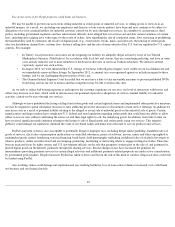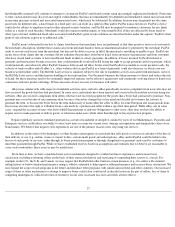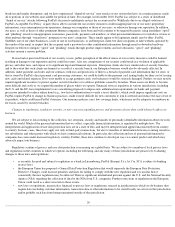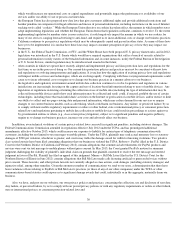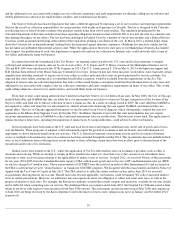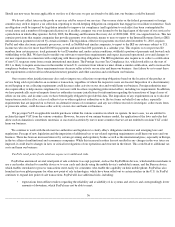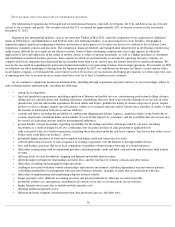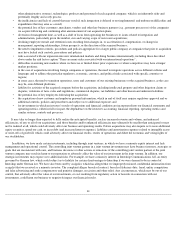eBay 2013 Annual Report Download - page 33
Download and view the complete annual report
Please find page 33 of the 2013 eBay annual report below. You can navigate through the pages in the report by either clicking on the pages listed below, or by using the keyword search tool below to find specific information within the annual report.
regulations (or, in the case of our Enterprise business, any such failure or perceived failure on the part of our Enterprise business or its clients)
could result in proceedings or actions against us by governmental entities or others (e.g., class action privacy litigation), subject us to significant
penalties and negative publicity, require us to change our business practices, increase our costs and adversely affect our business. The FTC and
state regulatory agencies have become more aggressive in enforcing privacy and data protection laws and regulations. For example, in 2012, the
FTC entered into a number of consent decrees with a number of major online companies, including Facebook and Google, to settle allegations of
unfair or deceptive privacy practices. The FTC's consent decrees with Facebook and Google require each of those companies to implement a
comprehensive privacy program and undergo regular, independent privacy audits for 20 years, among other requirements. In December 2012,
California's attorney general filed a lawsuit against Delta Air Lines for failing to include a privacy policy in its mobile applications.
Certain of our products, including some of Enterprise's marketing solutions, utilize “behavioral marketing” (generally, the tracking of a
user's online activities) to deliver relevant content to Internet users. The FTC has released a Staff Report with principles to address consumer
privacy issues that may arise from behavioral marketing and to encourage industry self-regulation. In March 2012, the FTC issued a final report
titled “Protecting Consumer Privacy in an Era of Rapid Change: Recommendations for Businesses and Policymakers,” which details the FTC's
perspective on best practices for companies that collect and use consumer data to protect the privacy of consumers. Should the FTC pursue
enforcement actions related to these business practices, we may be required to modify our business practices to conform and incur substantial
costs, which could harm our business.
Data collection, privacy and security have become the subject of increasing public concern. If Internet and mobile users were to reduce
their use of our websites, mobile platforms, products and services as a result, our business could be harmed. As noted above, we are also subject
to the possibility of security breaches, which themselves may result in a violation of these laws.
Bill Me Later's operations expose us to additional risks.
Risks associated with our reliance on unaffiliated lenders in providing the Bill Me Later service are discussed in more detail under the
caption “Bill Me Later's operations depend on lending services provided by unaffiliated lenders” above.
The Bill Me Later service relies on third-party merchant processors and payment gateways to process transactions. For the year ended
December 31, 2013 approximately 59% of all transaction volume by dollar amount through the Bill Me Later service was settled through the
facilities of a single vendor. Any disruption to these third party payment processing and gateway services would adversely affect the Bill Me
Later service.
The Bill Me Later service is offered to a wide range of consumers, and the financial success of this business depends on the ability of the
issuing banks of the Bill Me Later credit products to manage credit risk related to those products. The lenders extend credit using Bill Me Later's
proprietary segmentation and credit scoring algorithms and other analytical techniques designed to analyze the credit risk of specific customers
based on their past purchasing and payment history as well as their credit scores. Based on these performance criteria, a lender may extend or
increase lines of credit to consumers at the point of sale. These algorithms and techniques may not accurately predict the creditworthiness of a
consumer due to inaccurate assumptions about a particular consumer or the economic environment, among other factors. The accuracy of the
predictions and the ability of the lenders and Bill Me Later to manage credit risk related to the Bill Me Later service may also be affected by
legal or regulatory changes (e.g., bankruptcy laws and minimum payment regulations), competitors' actions, changes in consumer behavior and
other factors. A lender may incorrectly interpret the data produced by these algorithms in setting its credit policies, which may impact the
financial performance of the Bill Me Later service. In addition, economic and financial conditions in the U.S. may affect consumer confidence
levels and reduce consumers' ability or willingness to use credit, including the credit extended by a lender to consumers who use the Bill Me
Later service, which could impair the growth and profitability of this business.
Over the past several years, the volume of credit extended by the financial institutions issuing the Bill Me Later credit products has
increased as we have continued to enable qualified buyers with a PayPal account to use Bill Me Later as a payment funding option for
transactions on eBay.com and on certain merchant websites that accept PayPal. We purchase the receivables relating to these consumer loans
extended by the issuing banks, and therefore bear the risk of loss in the event of loan defaults. Like other businesses with significant exposure to
losses from consumer credit, the Bill Me Later service faces the risk that account holders will default on their payment obligations with respect
to the consumer loans, making the receivables uncollectible and creating the risk of potential charge-offs. The rate at which receivables were
charged off as uncollectible, or the net charge-off rate, was approximately 5.67% for the year ended December 31, 2013. The nonpayment rate
31




